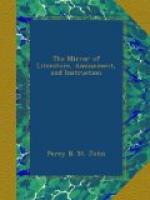143, Strand, June 27, 1831.
* * * * *
MEMOIR
OF
Baron Brougham and Vaux,
Lord high chancellor of great Britain, &C.
* * * * *
His purpose chose, he forward pressed
outright,
Nor turned aside for danger or delight.—COWLEY.
* * * * *
The illustrious subject of this Memoir is the eldest son of a gentleman of small fortune, but ancient family, in Cumberland,[1] His mother was the daughter of a Scotch clergyman; in the mansion of whose widow, on the Castle Hill of Edinburgh, the father of Lord Brougham lodged when prosecuting his studies at the University there. Chambers, the laborious topographical historian of the Modern Athens, says that Lord Brougham was born in St. Andrew’s Square, in that city, though this has been disputed. The family of the late Mr. Brougham consisted of four sons:—Henry John, an extensive wine-merchant in Edinburgh, who died at Boulogne, about two years since; James, the Chancery Barrister, who formerly sat with Baron Abercromby in parliament, for Tregony, and sits at present for Downton, Wilts; and William, who has recently been appointed a Master in Chancery, and elected Member for the Borough of Southwark.
In early life Mr. Brougham was called to the bar of the Supreme Court of Edinburgh, where he practised for some time, and with considerable success, if we may judge from his frequent employment in Scotch appeals. His selection, too, on the part of persons charged with political offences to conduct their defence, would imply him to be well read in the institutions of his country. It was while at the Scotch Bar that, in conjunction with the late Mr. Francis Homer and Mr. Jeffrey, he planned and established the Edinburgh Review, of which he was for many years a most able and constant supporter. About this time also he became a member of the celebrated Debating Society at Edinburgh.
Although professionally a lawyer, Mr. Brougham’s ambition soon became directed to the senate; and, observes a clever contemporary, “it is an instructive example of the working of our admirable system of representation, that, up to the 16th of October last, Henry Brougham, the greatest orator and statesman that perhaps ever enlightened Parliament, was indebted for his seat to the patronage of a borough-holding Peer.” He first took his seat for Camelford, a borough in the interest of the Duke of Bedford. In 1812, he contested Liverpool with Mr. Canning, and failed; and, in the same year, he was nominated for the Inverkeithing district of Boroughs, and failed there also. He was, however, subsequently returned for Winchelsea, in Sussex. During the discussions in parliament respecting the Princess of Wales, Mr.




